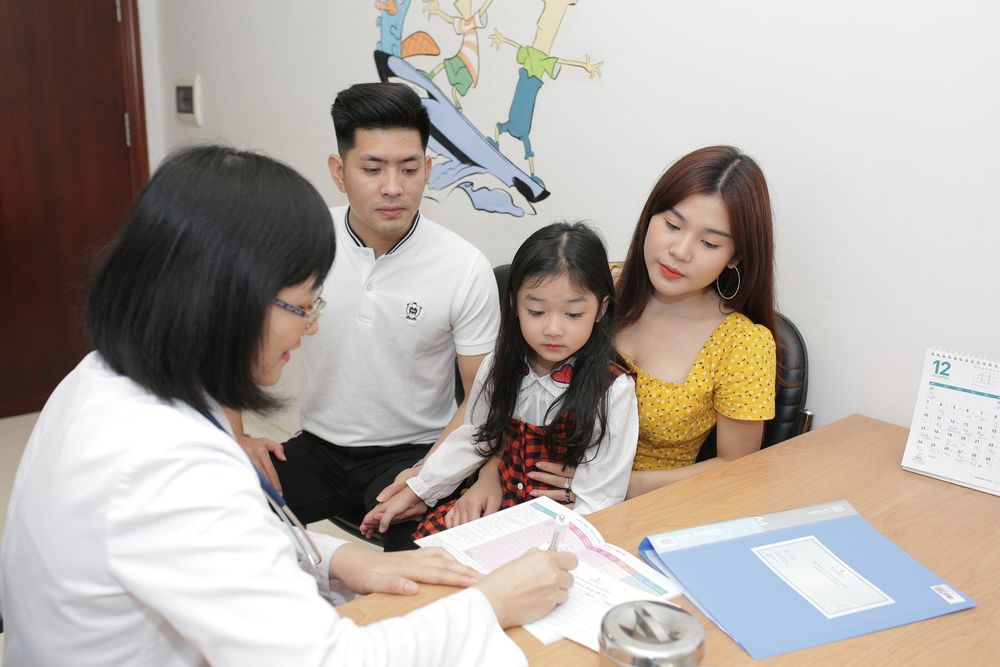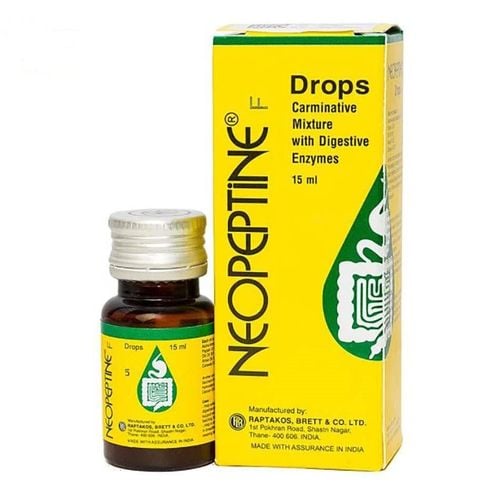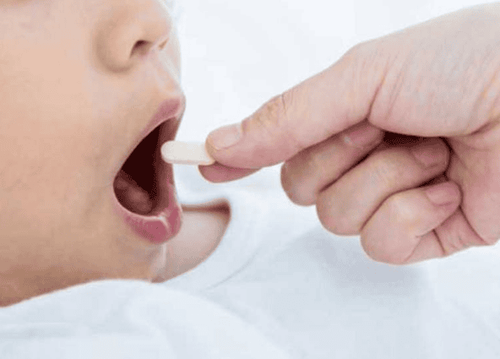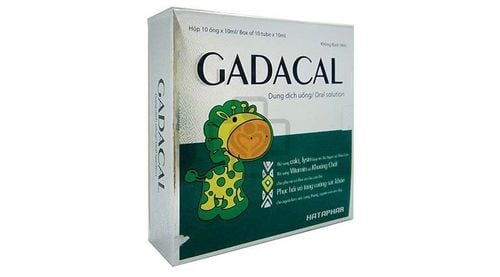This is an automatically translated article.
The article was consulted with Specialist Doctor I Dang Thi Ngoc Chuong - Department of Pediatrics - Neonatology, Vinmec Central Park International General Hospital.Malnutrition is a condition in which the child's body is not provided with enough energy, protein as well as other trace elements to ensure the normal development of the body. Besides the methods of taking care of malnourished children such as cleaning the living environment and changing the diet, parents should pay attention to periodically deworming their children.
1. What is malnutrition?
Malnutrition in children is a condition in which the body is deficient in essential nutrients, which directly affects the growth of weight, height as well as the general development of children. Malnutrition is common in children under 3 years of age. Malnutrition causes many consequences such as:Increases the risk of disease in children: When the child is malnourished, the resistance will be lower, creating conditions for bacteria to enter, causing diarrhea, respiratory infections, ... making the baby more anorexic, thin,... Affecting physical development: Malnutrition makes all organ systems in the child's body underdeveloped, causing Children are slow to develop height and weight compared to common standards. If prolonged, malnourishment will affect the baby's body shape and condition when the baby is an adult; Affects intelligence: Malnutrition slows brain development, slow reflexes, lack of flexibility and poor absorption; Psychological effects: Children with delayed growth in height and intelligence compared to their peers will lack confidence, timidity, and shyness.

Sự phát triển chiều cao ở trẻ suy dinh dưỡng chậm hơn so với các bạn cùng trang lứa
2. Causes of malnutrition in children
Malnutrition in children often originates from many factors such as:Due to nutrition: Improper feeding method when the mother is lacking or losing milk, feeding the child with incorrect supplementary food in quantity and quality, .. Due to prolonged illness: Children suffering from digestive diseases, respiratory tract infections many times, complications after pneumonia, measles, dysentery,... are often skinny and malnourished compared to their peers. litter; Due to malformations: Premature babies, fetal malnutrition, cleft lip, cleft palate, congenital heart defects; Due to socio-economic conditions: Malnutrition is a disease of poor economic status and low education level.
3. Signs of malnourished children
Not gaining weight or losing weight; Fat atrophy in the arms, bland meat; Small atrophy, loss of all subcutaneous fat; Blue skin, thinning hair, easy breakage, discoloration; Poor appetite, or digestive disorders (diarrhea, raw stools); Severe form: There is edema or atrophy, manifestations of vitamin deficiency causing night blindness, corneal dryness, corneal ulceration.
Trẻ ăn kém, sụt cân là dấu hiệu của suy dinh dưỡng
4. How to take care of malnourished children
For malnourished children, when caring for children, attention should be paid to the following issues:Sanitation of the living environment: Ensure that children eat, sleep, and play in a cool, clean, and bright place. Children's toys and utensils need to be clean and dry. Keep garbage in a closed place, far from living places and avoid flies and mosquitoes. Children need to eat cooked, drink boiled. Cooked food should be given to children immediately, if left for more than 3 hours, it needs to be boiled again before feeding. Avoid contaminated and contaminated food because they are a source of diarrhea, food poisoning, etc. The utensils for preparing food for children must also be hygienic;
Personal hygiene: Regular bathing for children, keeping children warm in winter to avoid colds and respiratory infections. At the same time, parents need to keep their children's clothes clean, their hair neat, and help them have the habit of keeping their teeth clean, and not eat too many sweets to avoid gingivitis and tooth decay. At the same time, do not allow children to suck their thumbs, wipe dirty hands on their faces, and do not put dirty toys in their mouths to avoid helminth infections;
Psychology: Parents should not be angry or intimidated when the child is anorexic because that action will make the child have aversion and even less want to eat. Even if the baby tries to swallow, it is difficult for the body to absorb due to physiological effects. Therefore, when feeding children, parents should create a comfortable, positive atmosphere;
Care when the baby is sick: When the child is sick, especially when there is diarrhea or respiratory infection, parents need to know the initial treatment at home. In addition to drug treatment, parents need to pay attention to proper nutrition care to help children recover quickly. To take care of children during illness, parents should give them nutritious foods so that they can fight off diseases. The foods can be stewed, pureed or given to the baby to eat a little, divided into many small meals during the day;

Tấy giun cho trẻ theo đúng định kỳ như chỉ dẫn của bác sĩ
Immunization: Immunize children with all the shots recommended by the Ministry of Health to help children increase their resistance and contribute to combating malnutrition;
Reasonable exercise: Parents should encourage children to exercise appropriately so that the organs in the body work more efficiently, strengthen the immune system, promote height growth, increase energy burning. and stimulate children's appetite, eat more deliciously, and reverse malnutrition.
5. Why is it necessary to deworm for malnourished children?
Children often crawl to play on the floor, suck their thumbs or put toys in their mouths,... These instinctive actions of babies make worms such as roundworms, hairworms, pinworms,... easy to go. into the body. When children are infected with worms, in addition to their residence and absorption of nutrients by the body, worms also cause many symptoms such as: Digestive disorders, hinder the absorption of nutrients of children, slow down the children. large, malnourished, weak resistance, susceptible to other infections. In particular, there are also some dangerous complications of worm infection such as: worms in the bile ducts, intestinal obstruction, severe anemia due to hookworms, genital infections caused by pinworms,...
Giun đi vào cơ thể khi trẻ bò lê trên sàn nhà, mút tay,.... và cản trở sự hấp thu dinh dưỡng của trẻ
6. Pay attention when deworming your baby
Normally, children 2 years of age and older should be dewormed. However, in cases where children are malnourished, growth retardation due to worm infection, parents can deworm earlier as prescribed by a doctor. Some commonly used drugs to deworm children are:Albendazol: Inhibits glucose uptake in larvae and adult worms, reduces glycogen stores, reduces energy, so the worms will be immobile and then die. The drug is effective on many types of worms such as: chopsticks, hooks, hair, needles, eels. A single dose for children from 2 years of age is 400mg. If you want to treat hookworms, take Albendazol 1 tablet per day for 3 consecutive days; Mebendazol: Depletes worms of glycogen stores and inhibits worm reproduction. This medicine is only for children over 2 years old. To deworm pinworms, parents give children 100mg to drink, after 2-4 weeks, take it again. To remove one or more worms such as hooks, hairs, needles, a single dose of 400mg is used; Pyrantel: With the brand name hemilltox 125mg and 250mg, it works by blocking the nerves - the organs of the worms, causing them to be paralyzed and the bowel movements will push them out. Pyrantel rub can be used to remove roundworms, hookworms, and pinworms for children from 1 year old up to a dose of 10mg/kg body weight. If the child has a lot of pinworm infections, it can be used again after 1 week with the same dosage as above.

Cho trẻ uống thuốc tẩy giun theo chỉ định của bác sĩ
7. How to prevent worm infections for children
Teach your child the habit of washing hands after going to the toilet and before eating; Let your baby drink cooled boiled water, eat cooked vegetables and fruits that must be peeled after washing; Regularly trim your child's nails and wash the anus with soap after each bowel movement. Do not let your baby defecate indiscriminately; In rural areas, it is necessary to arrange a faeces treatment area far from the place of residence, do not let children play with sandy soil; Periodic deworming every 6 months for the whole family. Parents should pay attention to how to take care of malnourished children, periodically deworm them to help them quickly catch up with their peers in the same age group.In the case of malnourished children, parents should supplement children with supportive products containing lysine, essential micro-minerals and vitamins such as zinc, chromium, selenium, and B vitamins to help fully meet their needs. nutritional needs in children. At the same time, these essential vitamins also support digestion, enhance nutrient absorption, help improve anorexia, and help children eat well. Parents can simultaneously apply dietary supplements and functional foods derived from nature for easy absorption. The most important thing is that improving your baby's symptoms often takes a long time. Combining many types of functional foods at the same time or changing many types in a short time can make the baby's digestive system unable to adapt and completely not good. Therefore, parents must be really patient with their children and regularly visit the website vimec.com to update useful baby care information.














